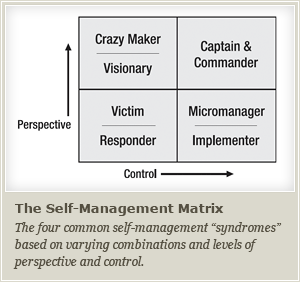The bottom left area of the diagram describes a person (or a
situation) who has little control and little perspective. In its most negative
expression, it characterizes a Victim — someone who is helpless, at
the mercy of outside forces. If you are in that quadrant, you are effectively
in a storm — somewhere between a mild squall and a major hurricane —
operating in a crisis mode. In a self-management context, this means that you
are simply dealing with only the latest and loudest. You are likely doing “emergency
scanning” of voice mails and e-mails, letting the not-yet-critical
stuff mount up in heaps, dealing exclusively with the tasks you have to do in
the moment. Of course, the bigger the pile of unprocessed stuff, the more
difficult it will be to navigate clearly and efficiently through it, and the
more likely something will turn into a crisis from neglect. You’re
not able to hold the world back long enough to do the catching up that would be
required to keep the next crisis from happening.
In this quadrant you’re just trying to keep the
ship afloat. Directions and goals won’t mean much until you can
ensure you’re not sinking to the bottom. It will likely feel
difficult to make any progress because you can never seem to get enough
breathing room to plan, organize, and elevate your focus.
When something happens that heightens the seriousness of this
situation in an obvious and dramatic way, it can create enormous
stress, if not downright panic. When in the course of preparing a nice dinner
for friends you burn the sauce, notice you forgot a key ingredient, can’t
find the special pan, cut your finger, and suddenly realize your guests are
going to show up before you have time to shower, you suddenly feel like a
victim of circumstances. If you start a new job and
unexpectedly discover that your predecessor screwed
up many key projects and processes which you’re now going to have to fix, throwing in the towel might
seem like a preferable option.
In its milder and perhaps more insidious form, and when
experienced over an extended period of time, this diminished sense of control
and perspective can give rise to a kind of numbness, out of sheer emotional
self-protection. Most people I have encountered in the professional world have
been in some version of this reactive state so consistently, and for so many years, that they’re not even aware
they’re in it. Only when some relief begins to appear do they begin
to realize how much pressure they have been under. It is much like gravity, in
that you hardly have any idea how much weight it places on the body until it is
absent.
On the Positive Side
Being out of control and out of focus is not inherently a
bad thing. In fact, we all very likely find ourselves being in this quadrant
many times a day in the natural course of getting things done. Much of our life
and work is actually involved with responding to situations that have been put
in motion, by ourselves and by others. We naturally play a defensive game when we chase a “stretch” goal, navigate a major
change, or respond to a simple but productive interaction. Of course bigger
objectives and risky moves into new and uncomfortable areas are even more
likely to lead to a certain amount of running like crazy to play catch-up.
Entrepreneurs in the early stages of a new venture, which
typically includes equal amounts of surprising successes and daunting setbacks,
often would give anything for some consistent sense of control and perspective.
They’ve jumped on a wild horse and are just trying to hold on for
dear life. Even a single conversation with a key person over lunch can generate
unexpected opportunities or issues that now must be dealt with, totally
destroying the best-laid plans for the afternoon.
No matter how much your life and work are up to par, you
will have to face at least momentary “leaks” in systems
that will have to be reengineered to allow you to return to an even keel. And
the more energetic and creative your endeavors are, the more likely that a
larger portion of your time and energies will be invested in doing catch-up.
Much of the energy in propelling a rocket is spent in course
correction — it is, in a way, always veering out of control and off
target. It achieves its goal precisely because it has a responsive feedback
mechanism that prevents it from wavering too far off its designated path.
Also, we may be in one quadrant about some issue and in a
totally different one for others. As I write this, my e-mail is quite under
control, but I am feeling somewhat disquieted by a very interesting opportunity
and project that presented itself in a meeting this morning with a major
corporate client. I’m not entirely sure yet what this proposal might
mean to us, how to best take advantage of it, and how it fits within the larger
scope of significant projects we already have in the works. So my momentary
workaday in-basket is on positive cruise control, but I am definitely leaning
toward feeling out of control with respect to the murky perspective on the horizon.
Whether I face this challenge as a Victim or Responder will
depend on whether I’m actively engaged in getting myself back to my
zone, having integrated the new input and recalibrated my psyche accordingly.
Adapted from "Making It All Work" by David Allen, by arrangement with Viking, a member of Penguin Group (USA) Inc.
